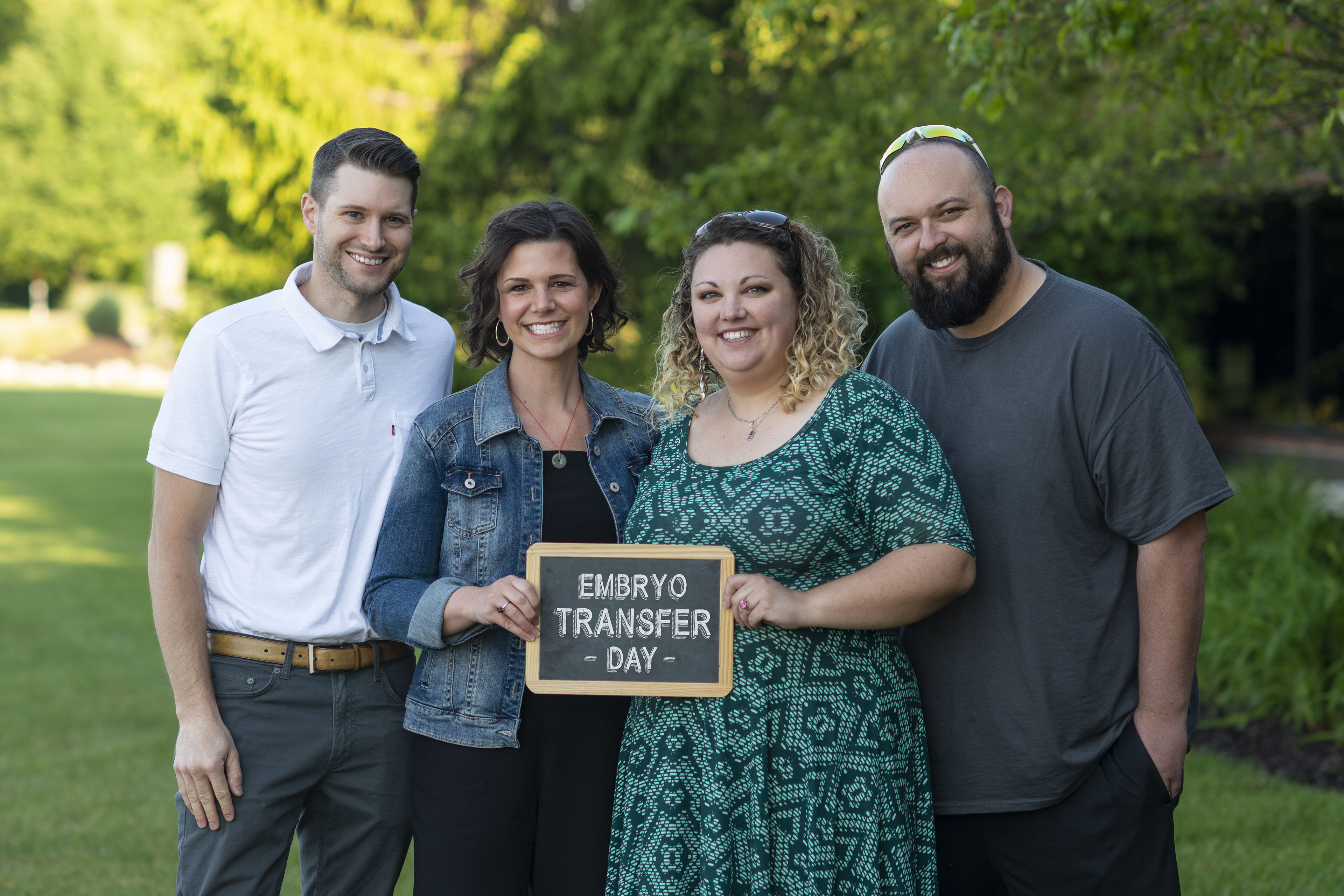Before Michigan legalized surrogacy, families found ways to circumvent the ban

When Tammy and Jordan Myers first held their twins, the premature babies were so fragile that their tiny faces were mostly covered by oxygen masks and tubes. Their little hands rested gently on Tammy’s chest as the machines keeping them alive in a neonatal intensive care unit in Grand Rapids, Michigan, beeped and hummed around them.
It was an incredible but terrifying moment. A court had just denied the Myers’ parental rights to the twins, who were born with the help of a surrogate from embryos created from Jordan’s sperm and Tammy’s eggs. (Tammy’s eggs had been frozen before she underwent breast cancer treatment.)
“In the first hours of her life, we had no life-saving medical decision-making authority for her care,” Tammy Myers told lawmakers at a Michigan Senate committee hearing in March.
Instead, state restrictions on surrogacy required the Myers to legally adopt their biological twins, Eames and Ellison.
“Although we have finally been granted legal rights for our twins nearly two years after their birth, the scars from this situation are still fresh and cast a long shadow over the precious memories we missed,” Myers told lawmakers, his voice faltering.
Until this spring, Michigan was the only state that had a broad criminal ban on surrogacy. Many families say the ban left them in a legal gray area: forced to leave the state to have children; forced to find strangers on Facebook to carry their child; or, like the Myers, forced to legally adopt their own biological children.
In April, Michigan Governor Gretchen Whitmer signed a law that repeals a 1988 criminal ban and legalizes surrogacy contracts and paid surrogacy after more than three decades. But the legalization has raised fears among conservatives and religious groups who share Pope Francis’ concerns that surrogacy exploits women and makes children “the basis of a commercial contract.”
With advances in reproductive technology in recent decades, most states have passed laws allowing and regulating surrogacy. But Michigan has not, says Courtney Joslin, a professor at the University of California-Davis School of Law who specializes in family law. But those restrictions haven’t stopped Michiganders from having children through surrogacy.
“Criminal or even civil bans do not end this practice,” Joslin said. “People are still practicing surrogacy, and it’s becoming increasingly clear that a ban simply leaves the parties without any protection. And that includes the person acting as a surrogate.”
In 2009, a couple in western Michigan had to give up custody of twins after the surrogate decided to keep the babies. The surrogate claimed she was unaware of the intended mother’s arrest and mental health problems. In 2013, a Connecticut surrogate fled to Michigan to give birth to the children, despite knowing she had custody under state law. She and the intended parents disagreed about whether to terminate the pregnancy after discovering severe fetal abnormalities.
The Myers family, however, believed they could avoid lengthy legal battles. They had the full support of their surrogate, Lauren Vermilye, a stranger who volunteered to be their surrogate after seeing Tammy’s posts on Facebook. But even though Vermilye and her husband Jonathan said the twins belonged to the Myers, judges in Michigan denied the Myers’ request for a prenatal order granting them parental rights.
“As a devoted family already raising our kind, inclusive and gentle eight-year-old daughter, Corryn, we were forced to prove our suitability through invasive psychological testing, home visits and endless discussions of our parenting plan to prove that we were fit to raise our twins, Eames and Ellison,” Tammy Myers told lawmakers in March.
Opponents of lifting Michigan’s surrogacy ban distinguish between altruistic surrogacy – in which the surrogate mother receives no compensation, including for her medical and legal expenses – and a contract for the birth of a child.
Late last year, Michigan House members passed legislation allowing courts to recognize and enforce surrogacy contracts. These laws allowed parents to compensate surrogates, including for medical and legal costs. But as the legislation advanced earlier this year, religious and conservative groups, as well as some Republican lawmakers, continued to voice opposition.
Michigan’s surrogacy laws do not prevent altruistic surrogacies in the state, argued Genevieve Marnon, legislative director of Right to Life of Michigan, at a hearing before a state Senate committee in March.
“However, current law requires legal adoption of a child born to a woman and then given to another person,” Marnon said. “This practice is designed to protect children, prevent the buying and selling of children, and ensure that the children go to a safe home.”
Michigan’s ban on surrogacy is “in line with the rest of the world,” Marnon said in March. Several European countries ban or restrict surrogacy, including Italy, which is cracking down on international surrogacy, an arrangement in which a surrogate mother lives in a different country than the biological parents.
“India, Thailand and Cambodia had laws similar to those in these bills, but because of the exploitation of their women through surrogacy tourism, they changed their laws to stop it,” Marnon told senators in March.
In January, Pope Francis called for a universal ban on surrogacy, “which represents a grave violation of the dignity of women and children, since it is based on the exploitation of the mother’s material need,” he said.
Rebecca Mastee, a policy attorney for the Michigan Catholic Conference, told lawmakers that while she recognizes the suffering of infertile people, surrogacy exploits women and treats babies like commodities.
“At the core of such agreements is a contract for a person,” she said.
“It made me furious to hear that,” said Eric Portenga. He and his husband, Kevin O’Neill, traveled from their home in Ann Arbor to the Capitol in Lansing in March to attend the hearings.
Once you’ve gone through the surrogacy process, “you know there’s no commercialization at all,” Portenga said. “You want a family because you have love to give. And you want to build the love you have with your family.”
When Portenga and O’Neill were trying to become fathers, they turned to surrogacy agencies in other states, but were told the procedure would cost $200,000. “We would have had to sell the house,” O’Neill said.
Like the Myers, the couple turned to Facebook and social media “to spread our story that we wanted to be fathers,” O’Neill said. A friend of a friend, Maureen Farris, contacted the couple: She had wanted to help a family through surrogacy for years, she said. And Farris lived just a few hours south in Ohio, where surrogacy contracts and compensation are legal.
Farris’ contract with Portenga and O’Neill was fairly standard. Both parties had to undergo a psychological background check and have legal representation. The contract also stipulated compensation for Farris that covered medical and legal fees. The contract stipulated that Farris was not allowed to travel to Michigan after a certain point in her pregnancy because if she went into labor and gave birth in the state, she would be considered the child’s legal mother.
That contract, Portenga and O’Neill said, gave Farris more protection and freedom of action than she would have had back in Michigan. “You’re carrying a human life inside you,” O’Neill said of surrogates. “They can’t work. Their bodies will be forever changed. They will be compensated for the incredible gift they give to people.”
After the embryo transfer was successful, Portenga and O’Neill learned that Farris was pregnant – with identical triplets.
“They came and just unraveled this huge array of ultrasound images and that’s when we knew our lives had changed,” said Portenga, sitting in the family kitchen at home. The girls were born in Ohio – where the fathers could officially be called their parents – and then the family of five returned to Michigan.
Today, Sylvie, Parker and Robin O’Neill are two years old and very busy. Parker is the “leader of the pack,” while Robin is the “brain of the operation” – she can count to 10 but likes to skip the number 5. Sylvie is “the most loving and sensitive of the three,” O’Neill said. “But their bond is so amazing to watch. And we are so lucky to be their dads.”
This article is part of a partnership that also includes Michigan Public, NPRand KFF Health News.
KFF Health News is a national newsroom that produces in-depth coverage of health issues and is one of the core operating programs of KFF – an independent source of health policy research, polling and journalism. Learn more about KFF.
USE OUR CONTENT
This story may be republished for free (details).



